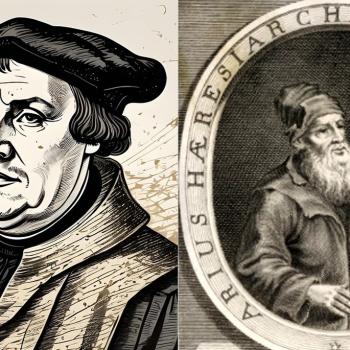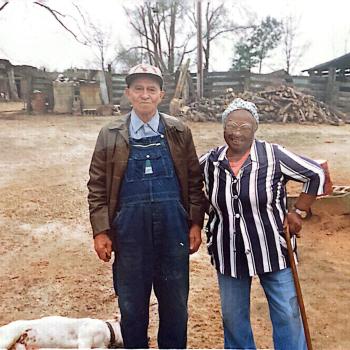Dorothy Day was born in Chicago in 1897. She wrote for several socialist newspapers and was involved in the politics of her day as an activist. Shortly after her daughter Tamar was born in 1927, Day and her daughter were baptized Catholic. As a result of that decision, her partner, Forster Batterham, who did not believe in organized religion, ended their common-law marriage.
Discerning what would come next, Day prayed for a sign at the Shrine of the Immaculate Conception in Washington, D.C. Shortly thereafter, Peter Maurin appeared on her doorstep. In their discussions of how to make the world a place in which it was easier to be good, the Catholic Worker newspaper was founded, and a movement sprang up around it. Consisting of houses of hospitality, communal farms, and roundtable discussions for what Maurin described as the clarification of thought, members of the Catholic Worker movement embrace the Works of Mercy as their mission.
A witness to nonviolence, even during the Second World War, Day worked tirelessly for social and economic justice and peace until her death in 1980. With houses of hospitality numbering 140 worldwide, her legacy lives on in those who endeavor to take part in the revolution of the heart, of which she wrote in Loaves and Fishes. As several contributors to From the Pews in the Back attest, Day's example continues to inspire contemporary Catholic women to commit their lives to service and justice in ways big and small.
Kate Henley Averett
Like these women who came before her, Kate Henley Averett discerns her own callings in her contribution to From the Pews in the Back. At the age of eight, she was disappointed to learn that she was not only disallowed from presiding over the Eucharist then, because she was not a priest, but that the priestly office was reserved "solely for men" in our denomination. Averett stands "pretty convinced that, had [she] been a boy, [she] would have been fast-tracked to the priesthood" because she "showed all the signs of a child with a vocation." Noting that these signs would have been "cause for celebration" in a young man, Averett recalls being drawn to priesthood as feeling "somehow wrong and unnatural," as "dangerously subversive." As she has grown since then, Averett is passionately ambivalent, to borrow her phrase, about a potential calling to priesthood. However, in light of her lived experience, in reflection on the sacred text of her life, she calls for those of all genders and sexual orientations to be provided with a space to discern their callings -- to priesthood or otherwise -- within Catholicism.
Whether the details of their lives are obscured by time and distance or they are as plain to us as the women sitting next to us in the pew, the women of whom I write provide a rich foundation for us to reflect on what is sacred in our lives and in our denominational communities. The word of God that seems to permeate the landscape of women like Mary the Mother of Jesus, continued to thrive in the lives of women like Julian of Norwich or Dorothy Day, and even today persists in the lives of others, like Kate Henley Averett.
All of their examples call on us to say yes as Mary did -- to the kind of mystical contemplation that gives birth to authorship, to an abiding commitment to justice and peace, to blurring the binaries that often define our understandings of gender and sexuality, to whatever it is that God calls us to do with our lives. As we discern anew the ways in which God spoke to the women of Scripture, it is equally important to discern God's voice in today's women and men, to treat the sacred texts of our lives with reverence.
Jennifer Owens is a co-editor of From the Pews in the Back: Young Women and Catholicism and a doctoral student at the Graduate Theological Union in Berkeley, CA.




